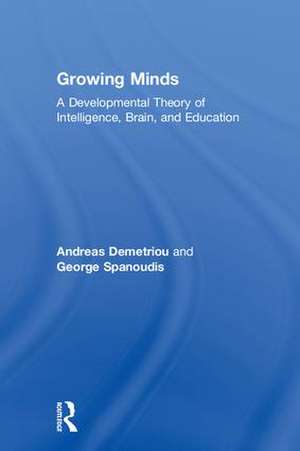Growing Minds: A Developmental Theory of Intelligence, Brain, and Education
Autor Andreas Demetriou, George Spanoudisen Limba Engleză Hardback – 5 feb 2018
The book sets out to answer a variety of questions:
- What are the cognitive processes underlying intelligence?
- What is general and what is specific in intelligence?
- What is stable and what is changing in intelligence as children grow older?
- Why do individuals differ in intelligence, and are differences genetically determined?
- How is intelligence and intellectual development related to the genome and the brain?
- How is intelligence related to personality?
- Can intelligence be enhanced by specific interventions?
This book is the result of decades of extensive research and culminates in the proposal of a new overarching and integrated theory of the developing mind. For the first time, research is gathered and combined to form a comprehensive concept and fulfil the need for a fresh, integrative paradigm which both asks and answers questions about the human mind from a multi-faceted perspective.
| Toate formatele și edițiile | Preț | Express |
|---|---|---|
| Paperback (1) | 364.54 lei 6-8 săpt. | |
| Taylor & Francis – 5 feb 2018 | 364.54 lei 6-8 săpt. | |
| Hardback (1) | 1005.80 lei 6-8 săpt. | |
| Taylor & Francis – 5 feb 2018 | 1005.80 lei 6-8 săpt. |
Preț: 1005.80 lei
Preț vechi: 1226.58 lei
-18% Nou
Puncte Express: 1509
Preț estimativ în valută:
192.52€ • 209.19$ • 161.82£
192.52€ • 209.19$ • 161.82£
Carte tipărită la comandă
Livrare economică 22 aprilie-06 mai
Preluare comenzi: 021 569.72.76
Specificații
ISBN-13: 9781138689824
ISBN-10: 1138689823
Pagini: 350
Ilustrații: 44
Dimensiuni: 156 x 234 x 21 mm
Greutate: 0.61 kg
Ediția:1
Editura: Taylor & Francis
Colecția Routledge
Locul publicării:Oxford, United Kingdom
ISBN-10: 1138689823
Pagini: 350
Ilustrații: 44
Dimensiuni: 156 x 234 x 21 mm
Greutate: 0.61 kg
Ediția:1
Editura: Taylor & Francis
Colecția Routledge
Locul publicării:Oxford, United Kingdom
Public țintă
Postgraduate, Professional, and UndergraduateCuprins
PART I Three traditions of research on the human mind 1 The experimental cognitive tradition 2 The differential tradition 3 Piaget’s theory 4 Neo-Piagetian theories 5 The development of reasoning 6 Awareness and knowledge about the mind 7 Core domains PART II An overarching theory of the growing mind 8 The organization of the human mind 9 Cycles and phases of development 10 Recycling and mediation of cognizance 11 Differentiation and binding of mental processes through developmental cycles 12 Personality and emotions in the minds 13 Genetic, psychological, and cultural aspects of the mind 14 Mapping mind-brain development PART III A developmental theory of instruction 15 School and intellectual development 16 Enhancing intelligence in the laboratory 17 Towards a theory of instruction 18 Educating critical thought 19 Conclusions: towards an overarching theory of the growing mind
Notă biografică
Andreas Demetriou is Professor of Psychology and President of the University of Nicosia Research Foundation, Cyprus. He was the Minister of Education and Culture of Cyprus, and President of the National Research Council of Cyprus.
George Spanoudis is Associate Professor in Psychology at the University of Cyprus.
George Spanoudis is Associate Professor in Psychology at the University of Cyprus.
Descriere
What does the mind involve? How does intelligence spring from it, differentiating between individuals in understanding and dealing with the world? How does the mind learn and grow over time and how can learning and growth be enhanced by education?
Growing Minds is an interdisciplinary work that seeks to answer these questions through the integration of the main theories relating to the brain and learning – namely the cognitive, developmental and individual difference perspectives. The authors propose an overarching and integrated theory of the developing mind, generating proposals on how this new theory can be applied to educational practice to improve student achievement.
Growing Minds is an interdisciplinary work that seeks to answer these questions through the integration of the main theories relating to the brain and learning – namely the cognitive, developmental and individual difference perspectives. The authors propose an overarching and integrated theory of the developing mind, generating proposals on how this new theory can be applied to educational practice to improve student achievement.
